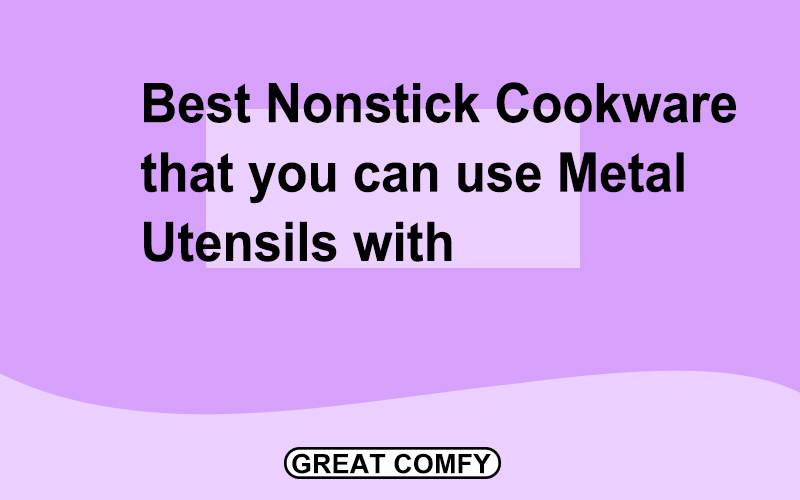If you’ve recently added a cast iron skillet to your kitchen arsenal, you’re probably aware of its benefits. Their excellent heat retention and a naturally non-stick surface if well-seasoned, are all good benefits, if you ask me. However, how good are they with metal utensils?
Can you use Metal Utensils on Cast iron?
The answer is yes, you can. It’s a common misconception that metal utensils will damage the seasoning of your cast iron pan, but in reality, a well-seasoned skillet is quite robust and can withstand the use of such utensils.
However, while your cast iron skillet is a tough piece of cookware, this doesn’t mean that you should be overly rough with it.
The key here is to use your metal utensils responsibly. This means no vigorous scraping or poking, which could potentially harm the seasoning if done aggressively.
The ¡®seasoning’ on your cast iron is a layer of hardened oil or fat that has been baked onto the iron. This gives your skillet its non-stick properties and protects it from rusting.
So, while metal utensils won’t necessarily remove this layer, scraping at it like you’re trying to unearth an archaeological find certainly might.
Interestingly, many chefs prefer using metal utensils on their cast iron cookware. The reason? Well, the heft and sturdiness of the cast iron are well-matched by metal utensils. There’s a satisfying balance between the weighty skillet and a solid metal spatula that plastic or wooden utensils just can’t replicate.
However, if you’re still uncomfortable with the idea of using metal utensils on your cast iron, there are other options available.
Let’s talk about them in the next option.
Other Safe Options To Use With Cast Iron
So, you’re not entirely sold on the idea of using metal utensils with your cast iron skillet. That’s okay, you’re not alone.
Many cooks, whether they are novices or experts, feel the same way. Thankfully, there are other options that still work out.
Wooden Utensils
Not only do they look classy, but they are also gentle on the surface of your skillet. They’re ideal for stirring, saut¨¦ing, and flipping food.
Bamboo utensils are particularly popular due to their durability and sustainability. One caveat with wooden utensils, though, is they do require some care. Avoid leaving them soaking in water, as they can absorb moisture and crack over time.
Silicone utensils.
These are known for their heat resistance ¨C some can withstand temperatures up to 500 degrees Fahrenheit, which makes them perfect for high-heat cooking in your cast iron skillet.
![]()
Silicone spatulas, for instance, are a godsend when it comes to scraping off those deliciously crispy bits from the bottom of your skillet, and you can do so without the slightest worry about damaging the seasoning.
Nylon utensils.
Like silicone, Nylon utensils are heat resistant and won’t scratch your skillet’s surface.
However, you need to ensure they are indeed heat-resistant as not all nylon utensils are created equal. Some may warp or melt under high heat, so it’s crucial to check the product details before using them in your cast iron pan.
How to Properly Care for your Cast Iron Cookware
It’s no secret that cast iron is a beloved kitchen staple, but it does require a bit of TLC to keep it in top shape. Here are some tips to help you care for your cast iron pans like a pro.
First things first, always start with a clean pan.
This means avoiding the use of harsh detergents or scrubbers that can damage the seasoning. Instead, opt for a gentle scrub with warm water and a soft sponge or brush.
After cleaning, dry them to prevent rust. You can either air dry it by placing it on a warm burner for a few minutes or by using a clean towel to pat it dry.
It’s also an important practice to always re-season your pan once in a while.
This means applying a thin layer of oil to the surface of the pan and heating it in the oven for an hour or so. This will help maintain and build up the seasoning, which is what makes cast iron nonstick and prevents rust and corrosion.
When it comes to cooking with your cast iron pan, it’s also important to use the right type of oil.
Opt for oils with a high smoke point, such as vegetable, canola, or grapeseed oil, to prevent the oil from breaking down and sticking to the pan.
Lastly, don’t be afraid to use your cast iron pan! The more you use it, the better it will perform. And if you do happen to make a mistake and damage the seasoning, don’t worry ¨C it’s fixable with a bit of re-seasoning.
Conclusion
Using metal utensils on cast iron cookware is possible, but it requires some care and attention to avoid damage to the seasoning and the formation of hot spots. By using the right type of metal utensils and being mindful of how much pressure you’re using, you can minimize the risk of damaging your cast iron pans.




